Pathogen antigen epitopes - Study guides, Class notes & Summaries
Looking for the best study guides, study notes and summaries about Pathogen antigen epitopes? On this page you'll find 130 study documents about Pathogen antigen epitopes.
Page 2 out of 130 results
Sort by
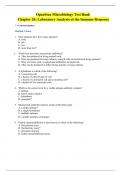
-
OpenStax Microbiology Test Bank Chapter 20: Laboratory Analysis of the Immune Response
- Exam (elaborations) • 13 pages • 2024
- Available in package deal
-
- $14.00
- + learn more
OpenStax Microbiology Test Bank Chapter 20: Laboratory Analysis of the Immune Response * = Correct answer Multiple Choice 1. Most antigens have how many epitopes? A. none B. one C. two D. more than two* 2. Which best describes monoclonal antibodies? A. They are produced in living animals only. B. They are produced in tissue cultures, using B cells extracted from living animals.* C. They are rarely used, so polyclonal antibodies are preferred. D. They can be produced in either liv...
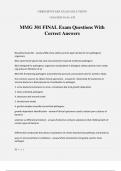
-
MMG 301 FINAL Exam Questions With Correct Answers
- Exam (elaborations) • 37 pages • 2024
-
- $11.49
- + learn more
©BRIGHTSTARS EXAM SOLUTIONS 11/16/2024 10:16 AM 1 | P a g e MMG 301 FINAL Exam Questions With Correct Answers Biosafety levels BSL - answerBSL1-few safety controls open lab bench non pathogenic organisms BSL2-open bench gloves lab coat eye protection required-moderate pathogens BSL3-designed for pathogens; organisms manipulated in biological safety cabinets room under neg pressure filtration of air BSL4-life threatening pathogens transmitted by aerosols, pressurized suits for workers-...
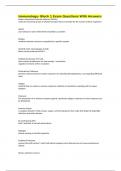
-
Immunology- Block 1 Exam Questions With Answers
- Exam (elaborations) • 19 pages • 2024
-
- $11.50
- + learn more
Immunology- Block 1 Exam Questions With Answers Pattern Associated Molecular Patterns (PAMPs) molecules shared by groups of related microbes that are essential for the survival of those organisms Ligand any molecule or atom which binds reversibly to a protein Epitope smallest molecular structure recognized by a specific receptor Dendritic Cells, Macrophages, B Cells What are the professional APCs? Peripheral Tolerance of T Cells Auto reactive lymphocytes are kept anergi...
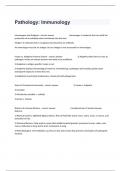
-
Pathology: Immunology Study Case Questions And Correct Answers.
- Exam (elaborations) • 28 pages • 2024
-
Available in package deal
-
- $12.99
- + learn more
Immunogens and Antigens - correct answer Immunogen: A molecule that can elicit the production of an antibody when introduced into the host. Antigen: A molecule that is recognized and bound by an antibody. An immunogen must be an antigen, but an antigen is not necessarily an immunogen. Innate vs. Adaptive Immune System - correct answer 1) Adaptive takes time to react to pathogen; innate are always present and ready to be mobilized. ...
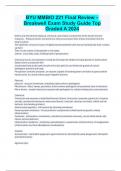
-
BYU MMBIO 221 Final Review – Breakwell Exam Study Guide Top Graded A 2024
- Exam (elaborations) • 6 pages • 2024
-
Available in package deal
-
- $13.99
- + learn more
Define and describe the physical, chemical, and cellular components of the innate immune response. - Physical factors are barriers to entry or processes that remove microbes from the body's surface The epidermis consists of layers of tightly packed epithelial cells that are periodically shed. (makes up dust) That it is dry makes it inhospitable to microbes. Cebum- unsat fatty acids; inhibit growth of persperation Chemical factors are substances made by the body that inhibit microbial gr...
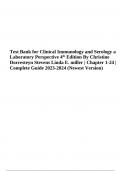
-
Test Bank for Clinical Immunology and Serology a Laboratory Perspective 4th Edition By Christine Dorresteyn Stevens Linda E. miller | Complete Chapter 1-24 2024 (Newest Version)
- Exam (elaborations) • 159 pages • 2024
-
- $33.49
- + learn more
Test Bank for Clinical Immunology and Serology a Laboratory Perspective 4th Edition By Christine Dorresteyn Stevens Linda E. miller | Complete Chapter 1-24 2024 (Newest Version) Eosinophils are involved in the immune response against: A. viruses. B. intracellular bacteria. C. parasites that cannot be phagocytized. D. extracellular bacteria. ANS: C 2. Which of the following are components of both innate and adaptive immune responses? A. Immunoglobulins B. T helper cells C. Macrophages D...
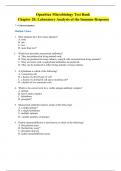
-
OpenStax Microbiology Test Bank Chapter 20: Laboratory Analysis of the Immune Response
- Exam (elaborations) • 13 pages • 2024
-
- $16.99
- + learn more
OpenStax Microbiology Test Bank Chapter 20: Laboratory Analysis of the Immune Response * = Correct answer Multiple Choice 1. Most antigens have how many epitopes? A. none B. one C. two D. more than two* 2. Which best describes monoclonal antibodies? A. They are produced in living animals only. B. They are produced in tissue cultures, using B cells extracted from living animals.* C. They are rarely used, so polyclonal antibodies are preferred. D. They can be produced in either liv...
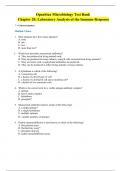
-
OpenStax Microbiology Test Bank Chapter 20: Laboratory Analysis of the Immune Response
- Exam (elaborations) • 13 pages • 2024
-
Available in package deal
-
- $14.00
- + learn more
OpenStax Microbiology Test Bank Chapter 20: Laboratory Analysis of the Immune Response * = Correct answer Multiple Choice 1. Most antigens have how many epitopes? A. none B. one C. two D. more than two* 2. Which best describes monoclonal antibodies? A. They are produced in living animals only. B. They are produced in tissue cultures, using B cells extracted from living animals.* C. They are rarely used, so polyclonal antibodies are preferred. D. They can be produced in either liv...
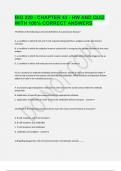
-
BIO 220 - CHAPTER 43 - HW AND QUIZ WITH 100% CORRECT ANSWERS
- Exam (elaborations) • 16 pages • 2023
- Available in package deal
-
- $14.99
- + learn more
59) Which of the following is the best definition of autoimmune disease? A. a condition in which B cells and T cells respond independently to antigens and do not interact correctly B. a condition in which the adaptive immune system fails to recognize the second infection by the same antigen C. a condition in which the immune system creates random antibodies without being triggered by an antigen D. a condition in which self molecules are treated as non-self D 61) In a humoral or ant...
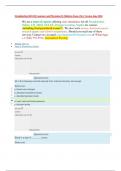
-
Straighterline BIO 202 Anatomy and Physiology II Midterm Exam (New Version June 2024)
- Exam (elaborations) • 23 pages • 2024
- Available in package deal
-
- $10.49
- + learn more
Straighterline BIO 202 Anatomy and Physiology II Midterm Exam (New Version June 2024) We are a team of experts offering class attendance for all Straighterline, Online ATI, HESI, NCLEX, Portage Learning, Sophia etc courses (including final proctored exams!!). We also write essays, discussion posts, research papers and school assignments. Should you need any of these services, Contact us via email: or : +1 (540) 753-5914. Guaranteed Passing! BIO202_MH_V4 Topic 6: Respiratory Syst...

Study stress? For sellers on Stuvia, these are actually golden times. KA-CHING! Earn from your study resources too and start uploading now. Discover all about earning on Stuvia


